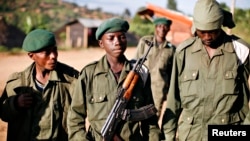The United States moved to block military assistance to five countries, including three in Africa, over their use of child soldiers in armed conflicts, U.S. officials said on Thursday.
The sanctions affect Central African Republic, Rwanda and Sudan as well as Burma (also known as Myanmar) and Syria, according to the U.S. State Department.
"Our goal is to work with countries who have been listed to ensure that any involvement in child soldiers — any involvement in the recruitment of child soldiers — stop," U.S. Assistant Secretary of State for African Affairs Linda Thomas-Greenfield said.
Three other countries whose militaries are known to recruit and use child soldiers, however, received waivers — Chad, South Sudan and Yemen, another State Department official said, speaking on condition of anonymity.
The Democratic Republic of Congo and Somalia received partial waivers, the official said, adding that the Obama administration has decided such exemptions "would be in the national interest of the United States."
By law, the U.S. State Department must keep track of nations whose governments recruit and use children as soldiers as part of its annual report on human trafficking. The 10 countries affected by Thursday's actions were all cited in the State Department's latest findings, issued in June.
Those countries can then be denied some types of U.S. funds for military assistance unless the White House grants a waiver. The 2008 law also allows U.S. officials to block licenses needed for those nations to buy military equipment.
It was not immediately clear how much U.S. funding would be blocked because of Thursday's action.
Rwanda was not granted a waiver because of its role backing the rebels in nearby Democratic Republic of Congo, Thomas-Greenfield, the top U.S. diplomat for Africa, said in an online forum with reporters broadcast on the State Department website.
U.N. investigators and the Congolese government have accused Rwanda of sponsoring the rebellion, a charge Rwanda denies.
"Any support of those rebel groups is seen as contributing to conflict in the region," Thomas-Greenfield told reporters, adding that U.S. officials will continue to discuss the issue with the Rwandan government.
The United States will still support peacekeeping efforts in Rwanda, the other official added.
The sanctions affect Central African Republic, Rwanda and Sudan as well as Burma (also known as Myanmar) and Syria, according to the U.S. State Department.
"Our goal is to work with countries who have been listed to ensure that any involvement in child soldiers — any involvement in the recruitment of child soldiers — stop," U.S. Assistant Secretary of State for African Affairs Linda Thomas-Greenfield said.
Three other countries whose militaries are known to recruit and use child soldiers, however, received waivers — Chad, South Sudan and Yemen, another State Department official said, speaking on condition of anonymity.
The Democratic Republic of Congo and Somalia received partial waivers, the official said, adding that the Obama administration has decided such exemptions "would be in the national interest of the United States."
By law, the U.S. State Department must keep track of nations whose governments recruit and use children as soldiers as part of its annual report on human trafficking. The 10 countries affected by Thursday's actions were all cited in the State Department's latest findings, issued in June.
Those countries can then be denied some types of U.S. funds for military assistance unless the White House grants a waiver. The 2008 law also allows U.S. officials to block licenses needed for those nations to buy military equipment.
It was not immediately clear how much U.S. funding would be blocked because of Thursday's action.
Rwanda was not granted a waiver because of its role backing the rebels in nearby Democratic Republic of Congo, Thomas-Greenfield, the top U.S. diplomat for Africa, said in an online forum with reporters broadcast on the State Department website.
U.N. investigators and the Congolese government have accused Rwanda of sponsoring the rebellion, a charge Rwanda denies.
"Any support of those rebel groups is seen as contributing to conflict in the region," Thomas-Greenfield told reporters, adding that U.S. officials will continue to discuss the issue with the Rwandan government.
The United States will still support peacekeeping efforts in Rwanda, the other official added.









